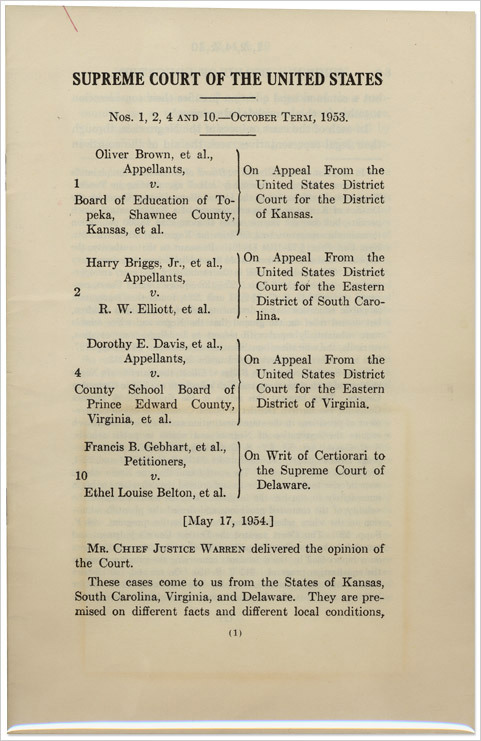Separate is Not Equal: the Brown v. Board of Education Supreme Court Decision
Annotation
Building on several more limited decisions in the 1940s, in 1954 the U.S. Supreme Court effectively rejected the language in the 1896 decision Plessy v. Ferguson, which had decreed that supporting separate-but-equal accommodations for African Americans was acceptable. In this brief excerpt from the decision by Chief Justice Earl Warren, he declares "Separate educational facilities are inherently unequal." Greensboro, North Carolina was the first city in the South to announce that it would comply with Brown v. Board of Education. But it was not until 1971, seventeen years after the Brown decision, that Greensboro finally integrated its public schools.

SUPREME COURT OF THE UNITED STATES
Brown v. Board of Education, 347 U.S. 483 (1954) (USSC+)
347 U.S. 483
Argued December 9, 1952
Reargued December 8, 1953
Decided May 17, 1954
APPEAL FROM THE UNITED STATES DISTRICT COURT FOR THE DISTRICT OF KANSAS*
MR. CHIEF JUSTICE WARREN delivered the opinion of the Court.
.... In approaching this problem, we cannot turn the clock back to 1868, when the Amendment was adopted, or even to 1896, when Plessy v. Ferguson was written. We must consider public education in the light of its full development and its present place in American life throughout the Nation. Only in this way can it be determined if segregation in public schools deprives these plaintiffs of the equal protection of the laws.
Today, education is perhaps the most important function of state and local governments. Compulsory school attendance laws and the great expenditures for education both demonstrate our recognition of the importance of education to our democratic society. It is required in the performance of our most basic public responsibilities, even service in the armed forces. It is the very foundation of good citizenship. Today it is a principal instrument in awakening the child to cultural values, in preparing him for later professional training, and in helping him to adjust normally to his environment. In these days, it is doubtful that any child may reasonably be expected to succeed in life if he is denied the opportunity of an education. Such an opportunity, where the state has undertaken to provide it, is a right which must be made available to all on equal terms.
We come then to the question presented: Does segregation of children in public schools solely on the basis of race, even though the physical facilities and other "tangible" factors may be equal, deprive the children of the minority group of equal educational opportunities? We believe that it does....
Segregation of white and colored children in public schools has a detrimental effect upon the colored children. The impact is greater when it has the sanction of the law, for the policy of separating the races is usually interpreted as denoting the inferiority of the negro group. A sense of inferiority affects the motivation of a child to learn. Segregation with the sanction of law, therefore, has a tendency to [retard] the educational and mental development of negro children and to deprive them of some of the benefits they would receive in a racial[ly] integrated school system.
Whatever may have been the extent of psychological knowledge at the time of Plessy v. Ferguson, this finding is amply supported by modern authority. Any language in Plessy v. Ferguson contrary to this finding is rejected.
We conclude that, in the field of public education, the doctrine of "separate but equal" has no place. Separate educational facilities are inherently unequal. Therefore, we hold that the plaintiffs and others similarly situated for whom the actions have been brought are, by reason of the segregation complained of, deprived of the equal protection of the laws guaranteed by the Fourteenth Amendment. This disposition makes unnecessary any discussion whether such segregation also violates the Due Process Clause of the Fourteenth Amendment.
Source
Supreme Court of the United States, Brown v. Board of Education, 347 U.S. 483 (1954), (USSC+).





